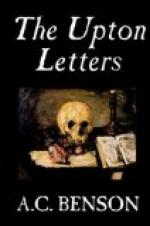Presently, by the kind offices of a pleasant simple verger, I did more. I mounted on some steps he brought, and looked face to face at the bust in the monument.
I cannot share in the feelings of those who would consider it formal or perfunctory. There was the high-domed forehead, like that of Pericles and Walter Scott; there were the steady eyes, the clear-cut nose; and as for the lips—I never for an instant doubted the truth of what I saw—I am as certain as I can be that they are the lips of a corpse, drawn up in the stiff tension of death, showing the teeth below. I am absolutely convinced that here we get as near to the man as we can get, and that the head is taken from a death-mask. What injures the dignity and beauty of the face is the plumpness of the chin that testifies to the burgher prosperity, the comfortable life, the unexercised brain of the later days. I saw afterwards the various portraits; I suppose it is a matter of evidence, but nothing convinced me of truth, not even the bilious, dilapidated, dyspeptic, white face of the folio engraving, with the horrible hydrocephalous development of skull. That is a caricature only. The others seem mere fancies.
Then I saw patiently the other relics, the foundations of New Place, the schoolhouse—but all without emotion, except a deep sense of shame that the only records allowed to stand in the long, low-latticed room in which the boy Shakespeare probably saw a play first acted, are boards recording the names of school football and cricket teams. The ineptitude of such a proceeding, the hideous insistence of the athletic craze of England, drew from me a despairing smile; but I think that Shakespeare himself would have viewed it with tolerance and even amusement.
But most of these relics, like Anne Hathaway’s Cottage, are restored out of all interest, and only testify to the silly and frivolous demands of trippers.
But, my dear Herbert, the treasure is mine. Feeble as the confession is, I do not think I ever realised before the humanity of Shakespeare. He seemed to me before to sit remote, enshrined aloof, the man who could tell all the secrets of humanity that could be told, and whose veriest hints still seem to open doors into mysteries both high and sweet and terrible. But now I feel as if I had been near him, had been able to love what I had only admired.
I feel somehow that it extends the kingdom of humanity to have realised Shakespeare; and yet I am baffled. But I seem to trace in the later and what some would call the commonplace features of the man’s life, a desire to live and be; to taste life itself, not merely to write of what life seemed to be, and of what lay behind it. I am sure that some such allegory was in his mind when he wrote of Prospero, who so willingly gave up the isle full of noises, the power over the dreaming, sexless spirits of air and wood, to go back to his tiresome dukedom, and his petty




